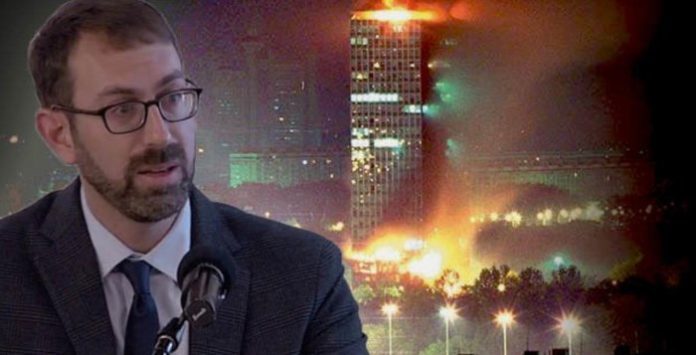
Han sagde, at han ønskede, at internationalisme skulle falde sammen med opvågningen af progressive politikker, men at det først var efter Irak-krigen, at han indså, at hans handlinger i tyverne ville få alvorlige konsekvenser.
"Min skrivning om menneskerettigheder er også en måde at reflektere over alle disse begivenheder på," siger Moyn, der har skrevet fire bøger om menneskerettigheder.
Han siger, at han på tidspunktet for bombningen af FRJ havde opgaven med at 'offentlig diplomati' - at servere nogle fakta til medierne om krigen.
"Selvfølgelig offentliggjorde jeg ikke alle fakta, men kun dem, der var gunstige for vores præsentation af krigen. Problemet er, at der var få journalister, der uafhængigt undersøgte deres egne fakta. I Vietnam søgte journalister mere efter deres egen eksklusive sandhed, hvilket ikke er tilfældet med de krige, der føres af USA i dag ', sagde professoren.
Kommentar: Delvist oversat af Sott.net fra Yale professor admits he planted stories so that NATO could bomb Serbia in 1999
Se også:
- The Weight of Chains: USA og NATO's ødelæggelse af Jugoslavien (Dokumentar)
- Yugoslavien afbrudt: En europæisk succeshistorie ruineret af NATO invasion
- Rammende forudsigelser i 2001, hvorfor Slobodan Milošević blev dæmoniseret af Vesten
- NATO's krig mod Yugoslavien: Dæmonisering af serberne var nøglen
- 5. oktober 2000: Husk Yugoslavien, vestens første offer for en farverevoluion
- Lebensraum A/S: Hvordan Tyskland gik sammen med Washington om at opdele Yugoslavien og nære islamisk terrorisme i Europa
- "Den virkelige Balkanslagter" var NATO
- Dæmoniseringskampagnen løber ud i sandet: Milosevic frikendt for alle falske beskyldninger, mens NATO krigsmaskinen raser videre
- Hvorfor reducerer NATO balkanlandene og prøver at tvinge Milosevic til at overgive sig?
- På 20 års dagen efter NATO begyndte bombningen af et europæisk land - 'Det er derfor at vi aldrig vil træde ind i NATO,' siger Serbiens forsvarsminister
- Alex Krainer: Hvorfor jeg skrev "Grand Deception - The Truth About Bill Browder"
- NATOs 'humanitære' bombning af Serbien har medført en drastisk forøgelse i kræfttilfælde
- Irakiske børn betaler prisen for krig med alarmerende høje niveauer af giftige tungmetaller, kræft og medfødte defekter
- Profiler i psykopati: John McCains uhyrligheder
- Hillary Clintons udenrigspolitik i fire ord: 'Et blodbad efter hinanden'
He also believes that it is true that the bombing of Yugoslavia did not have its own Seymour Hersh who, through his research, overthrew the dominant narrative of the Vietnam War.
Moyn also spoke about the fact that interventions in the world happen without the support of the UN. He says that since 1989 any restrictions on wars by the great powers have diminished.
"It's especially true when a permanent member of the Security Council is wages war, like Russia in the Crimea or the US. I think American exceptionalism cares less about peace and more about humanity. Americans worry about how prisoners will be treated or how many civilians are killed by drones, but they do not appear to care about endless war as such. This is something new... ", Moyn suggests.
He also believes that there have been few successful humanitarian interventions in the world that have helped reduce problems and suffering. In this regard, politicians have failed.
Moyn also maintains that the intellectuals in the 90s failed to see what was really going on, which was the awakening of the imperial world after the end of the bilateral Cold War regime.
"Intellectuals have contributed to the myth that there will be a moral end to history. Today we can see that darker forces were at work", the historian concludes.
Miroslav Krstić offers this translation of a piece by Tanjug which appeared on Vidovdan.
Read the original source (in Serbian) here: vidovdan.org/info/americki-istoricar-priznao-sta-je-radio-1999-sejao-sam-price-da-bi-nato-mogao-da-bombarduje-srbiju/



Kommentar: See also: The Weight of Chains: US/NATO Destruction of Yugoslavia (Documentary)